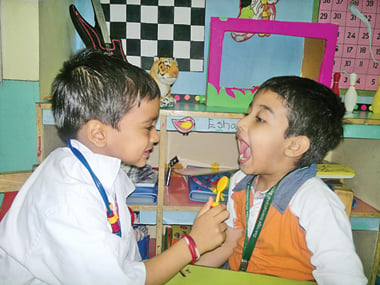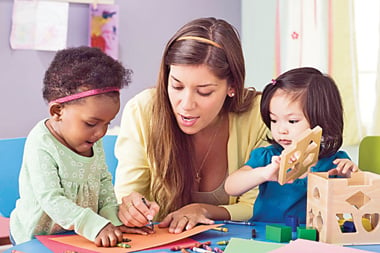This week You! talks to a few moms on how they maintain their children’s interest in learning through play and recreational activities...
parenting
This week You! talks to a few moms on how they maintain their children’s interest in learning through play and recreational activities...
When it comes to studies, our kids are under a lot of pressure. Children are so overburdened that they hardly get any time off to indulge in play and other recreational activities, essential for their development. It is through play that these young minds can enhance their creative streak, develop learning and participate in activities that will shape them into confident and civilized individuals.
Playful learning
Did you know that play is the basis of all art, games, books, sports, movies, fashion, fun, and wonder? For many, play can be considered as any action freely chosen, intrinsically motivated, and personally directed. Play is not a specific behaviour, but an activity undertaken with a playful frame of mind. All types of play, from fantasy to rough-and-tumble, have a crucial role in a child’s development. It is the lens through which children experience their world, and the world of others. With supportive adults, children can enjoy their leisure time along with adequate recreational space, and an assortment of play materials, children stand the best chance of becoming healthy, happy and productive members of the society. Also, within the context of play, children practice innovative behaviours and social competencies. Usually through play, parents assign roles and duties to children so as to make them aware of their responsibilities.
Keeping this in mind, You! talks to a few moms from different parts of the world, on how they maintain their children’s interest in learning through play and recreational activities...
Mommies’ diaries
Saira resides in Lahore and deals with her two sons, aged 10 & 5, efficiently. “I make them count while putting away the clothes or picking up toys. When eating, they even count their fries. I play eye spy with them when we are in the car to build vocabulary. Also, to teach about animals we take them to the zoo here or even when we go abroad. By watching animals’ behaviours they also understand how each one is different,” shares Saira. On how she works on her sons’ behaviours, she states, “To teach them how to be kind I often give them a pack of sweets and ask them to distribute in the classroom. To make them introduce to numerous colours, we do painting together. I don’t tell them what colours are used to paint a particular thing. I just let them explore the colour schemes themselves. This way, they gain confidence to do what they want to do.”
Interestingly, Mrs Ahsan (Karachi) has some more creative ideas to make her four-year-old daughter learn some useful things. “When she was almost three, I used to cut out shapes with bread slices, and that is how she learnt shapes. While going up and down the stairs, I used to count with her. When I used to take her to play on the slides, I observed that she was counting on her own,” tells Mrs Ahsan.
“As to make her recognize colours, I would point out at different fruits. So this way she not only learnt the colours but memorized names of the fruits as well,” she adds.
In the west moms give a lot of attention to the value of play in their children’s upbringing. Fariha from Canada is a mother of two toddlers. “Along with education, quality play time is equally important since it helps in developing a child’s mental abilities, creativity and learning. Nowadays, children avoid physical involvement and are mostly binging on TV and electronic gadgets, which leads to a sedentary lifestyle,” she shares.
“Teaching in a playful manner not only increases the child’s creativity but their gross motor, fine motor and cognitive skills. Since my kids are not going to school right now, I have to make sure that I keep them involved with me and build their knowledge. For that I try to make them learn different things through play like helping them in identifying letters, reading and remembering a story, painting, colouring, puzzles & pretend play apart from singing rhymes with actions. Also, since my son is a picky eater, I have to play games with him so that eating becomes enjoyable and interesting. I introduce different colours, shapes and sizes in the form of food on his plate,” enunciates Fariha.
On the other hand, Sumaira Ahmed (US) believes that it depends on the age group and every child is dealt according to his/ her age. “My son is 11 and daughter is 8 years old. I usually allow my son to play games on the weekend with his friends for at least two hours outside. As far as my daughter is concerned, she has the same playtime routine. As they are at elementary level, they don’t get much homework and parents have to constantly come up with different activities. I keep them busy by giving them chores which also aid them in personal and mental growth. Furthermore, with this I can transfer a sense of responsibility in my children. Like folding their clothes and organizing their toys. Moreover, both of them help me in the kitchen sometimes in preparing food and setting up the table,” states Sumaira.
Another mom, Sadia from Canada, shares her experience with her 7-year-old son, Basil. “This winter I was not working, so I took it as an opportunity to spend quality time with my son. I assigned him tasks in a playful manner; from daily chores to mental math assignments. I also tried to interact with him after school during which we walked together and discussed about his school activities and friends. This is basically a good way to make him learn how to reflect his thoughts and work on his personality. Furthermore, I involved him in household chores like cleaning, making chappatis, baking lasagne and pizza. This also establishes a strong bond that we get to develop through such exercises,” she stresses.
Sadia also informs, “Since my son is keen on watching sketching tutorials of his favourite characters from Roblox and Pokemon, it piqued his interest in sketching. I must say it has rapidly built up his creative side. Then comes the homework which is mostly based on making sentences with words having grapheme marking, along with weekly open court reading. Every night we give 30 to 35 minutes to reading before going to bed. He also took part in skating classes arranged at Brentwood School (TLC Program), as I want him to learn ice hockey in the future. This summer I am planning to send him to learn cycling and swimming to minimize his screen time as much as possible.”
Despite the benefits derived from play for both children and parents, time for free play has been markedly reduced. So, it is mandatory to include play and physical activities in children’s lifestyle; or else they will produce dull personalities.